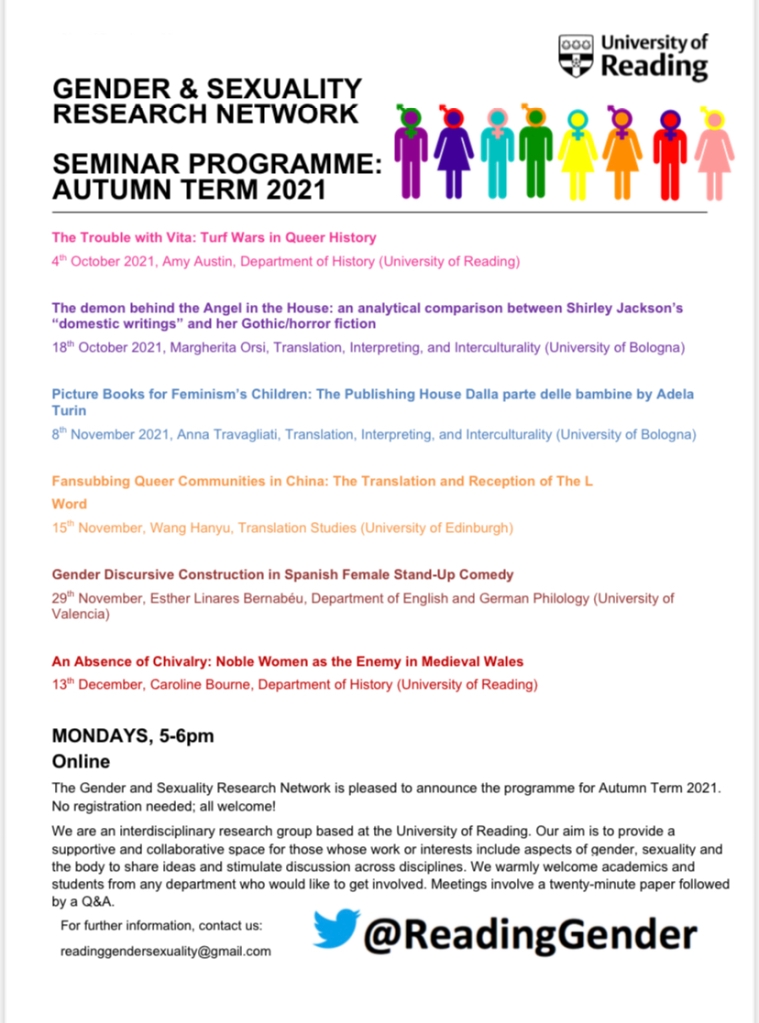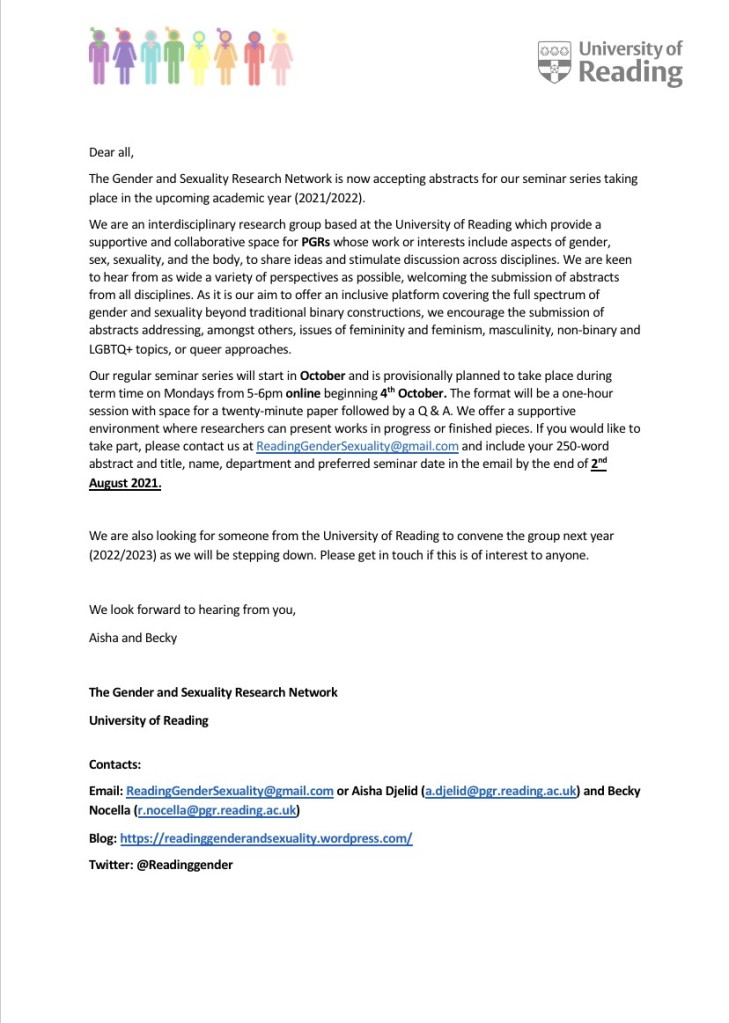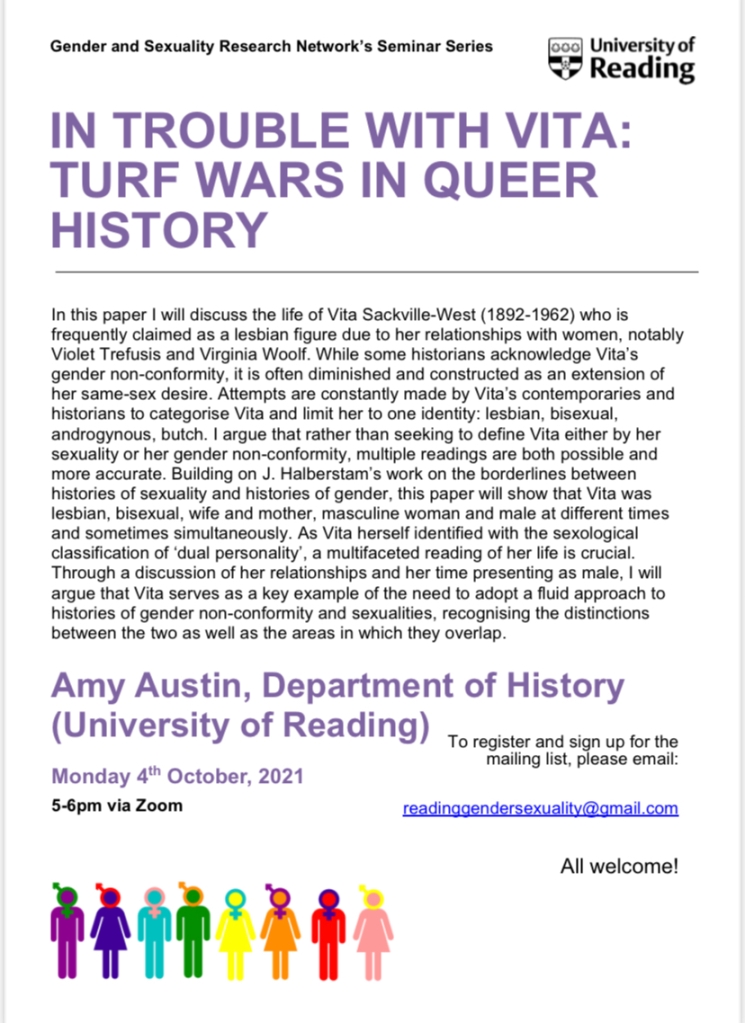
Seminar today!
Join us today at 5pm for Caroline Bourne’s fascinating paper on Early Medieval Welsh Saints! Email us for the zoom link.

Spring 2021 Seminar series
Happy New Year! It is our pleasure to invite you to the Reading Gender and Sexuality Research Network Spring term seminar series. We would like to thank last term’s speakers, and officially circulate the program for this term. Please note that the seminars this term will be every other Monday.
See below for the program for this term, with our first session kicked off with Lucy Mounfield’s paper ‘Gendering of Photography: The Case of Vivian Maier as ‘Nanny Photographer”, on Monday 18th January at 5pm. The seminars will take place on zoom (we will send the link out closer to the time), and will take the format of a 20-minute presentation followed by a Q&A. If you would like to be added to the mailing list for the zoom link, please email ReadingGenderSexuality@gmail.com .
Autumn Term 2020 Series
It is our pleasure to invite you to the Reading Gender and Sexuality Research Network Autumn term seminar series. See below for the program for this term, with our first session kicked off with Erin Shearer’s (University of Reading) paper, ”She grabbed his privates and pulled ’em out by the roots’. Mutilation and Castration: Enslaved Women’s Gendered Responses to Sexualised Violence in the Antebellum South,’ on Monday 23rd November at 5pm. The seminars will take place on zoom (we will send the link out closer to the time), and will take the format of a 20-minute presentation followed by a Q&A. If you would like to be added to the mailing list for the zoom link, please email ReadingGenderSexuality@gmail.com .
We look forward to seeing you there,
Aisha Djelid and Becky Nocella

Call for Papers: Seminar Series 2020/2021
Dear all,
The Gender and Sexuality Research Network is now accepting abstracts for our seminar series taking place in the upcoming academic year (2020/2021).
We are an interdisciplinary research group based at the University of Reading which provide a supportive and collaborative space for those whose work or interests include aspects of gender, sex, sexuality, and the body to share ideas and stimulate discussion across disciplines. We are keen to hear from as wide a variety of perspectives as possible, welcoming the submission of abstracts from all disciplines. As it is our aim to offer an inclusive platform covering the full spectrum of gender and sexuality beyond traditional binary constructions, we encourage the submission of abstracts addressing, amongst others, issues of femininity and feminism, masculinity, non-binary and LGBTQ+ topics, or queer approaches.
Our regular seminar series will start in November and is provisionally planned to take place during term time on Mondays from 5-6pm, online, beginning 23rd November. The format will be a one-hour session with space for a twenty-minute paper followed by a Q & A. We offer a supportive environment where researchers can present works in progress or finished pieces. If you would like to take part, please contact us at ReadingGenderSexuality@gmail.com and include your 250-word abstract and title, name, department and preferred seminar date in the email by the end of Wednesday 4th November 2020.
We look forward to hearing from you!
The Gender and Sexuality Research Network
University of Reading
Contacts:
Email: ReadingGenderSexuality@gmail.com or Aisha Djelid (a.djelid@pgr.reading.ac.uk) and Becky Nocella (r.nocella@pgr.reading.ac.uk)
Blog: https://readinggenderandsexuality.wordpress.com/
Twitter: @Readinggender
Call for Papers: Seminar Series 2019/20
Happy Autumn to all of our followers and friends!
The Gender and Sexuality Research Network is now accepting abstracts for our seminar series taking place in the upcoming academic year (2019-2020).
We are an interdisciplinary research group based at the University of Reading which provide a supportive and collaborative space for those whose work or interests include aspects of gender, sex, sexuality, and the body to share ideas and stimulate discussion across disciplines. We are keen to hear from as wide a variety of perspectives as possible, welcoming the submission of abstracts from all disciplines. As it is our aim to offer an inclusive platform covering the full spectrum of gender and sexuality beyond traditional binary constructions, we encourage the submission of abstracts addressing, among others, issues of femininity and feminism, masculinity, non-binary and LGBTQ+ topics, or queer approaches.
Our regular seminar series will start in November and is provisionally planned to take place during term time on Mondays from 5-6pm in Edith Morley 144. The format will be a one-hour session with space for a twenty-minute paper followed by a Q & A. We offer a supportive environment where researchers can present works in progress or finished pieces. If you would like to take part, please contact us at ReadingGenderSexuality@gmail.com and include your 250-word abstract and title, name, department and preferred seminar date in the email by the end of Monday 14th October 2019.
We are also keen to hear from researchers interested in convening the network. If you would like to take on a role to help keep the GSRN running, then do also get in touch with Amy at amy.gower@pgr.reading.ac.uk or via the main GSRN email (see below).
We look forward to hearing from you!
The Gender and Sexuality Research Network
University of Reading
Contacts:
Email: ReadingGenderSexuality@gmail.com or amy.gower@pgr.reading.ac.uk
Blog: https://readinggenderandsexuality.wordpress.com/
Twitter: @Readinggender
Meeting Report: Marco Bernardini – (Gender) identity: some visceral temptations.
Marco Bernardini finished his PhD in Politics at Reading University in 2015 and has been another familiar face to GSRN-ers ever since, so we were delighted to welcome him this week as a presenter. Marco’s talk was a work in progress and sparked some productive discussion.
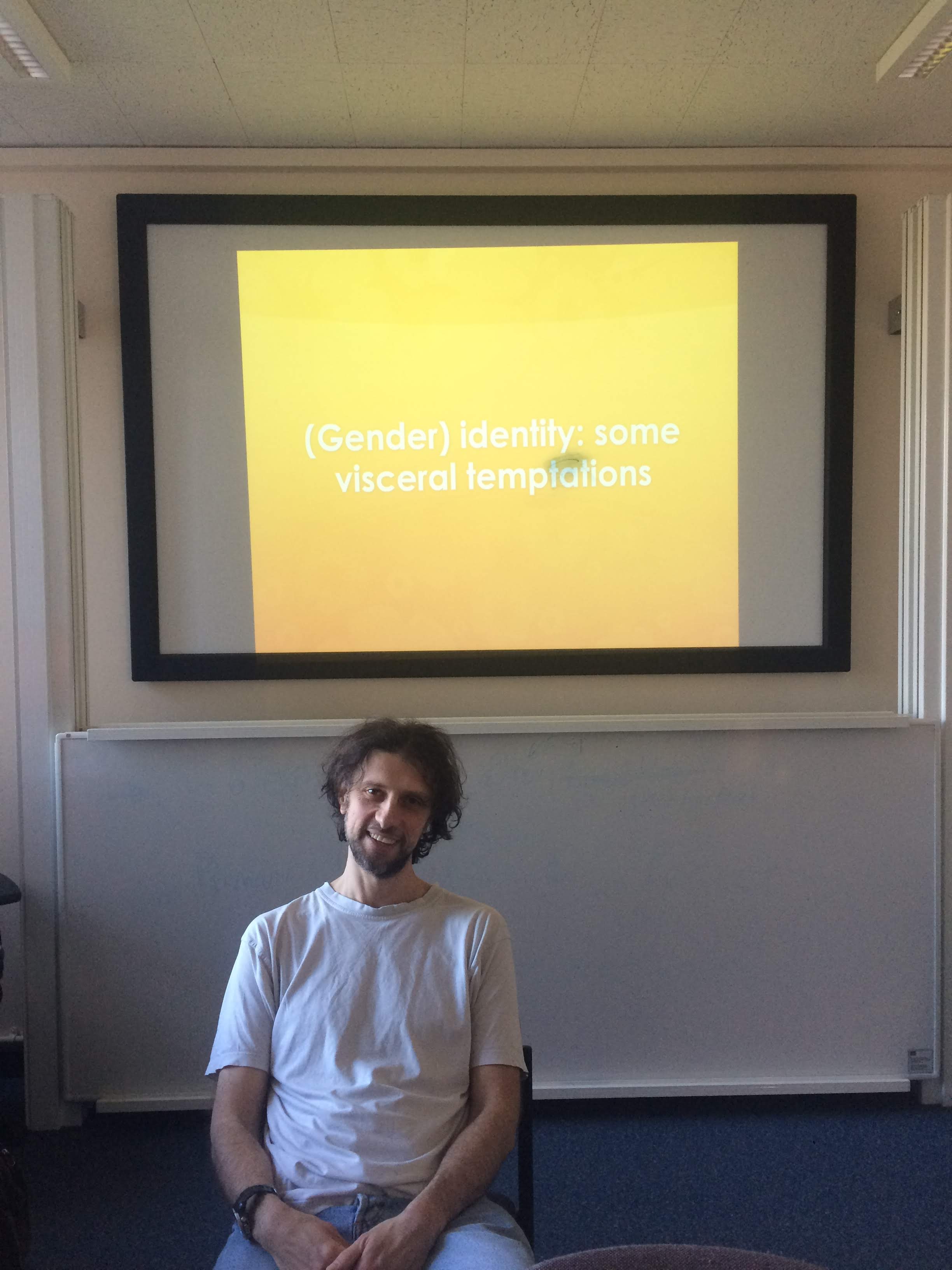
Marco’s interest in writing about this topic was piqued when he came across some scientific articles announcing the existence of the ‘microgenderome’; a derivative of the ‘microbiome’, i.e. the bacteria living in the gut, the ‘microgenderome’ is a term recently coined to describe the interaction (and the effects this interaction produces) between the sexual biological features of a given organism (such as a mouse or a human being) and the gut bacteria that live in its guts. Marco analysed three articles: ‘Welcome to the microgenderome’ overviews discoveries made in an experiment conducted on mice and it is where this concept was introduced. The other two articles, ‘Support for the microgenderome: associations in a human clinical population’ and ‘Support for the microgenderome invites enquiry into sex differences’, use the microgenderome to advance a novel explanation for the differences in symptomatology men and women affected by Chronic Fatigue Syndrome (CFS) experience.
After some introductory remarks, Marco started off by proposing that the three articles are underpinned by a number of assumptions: for example, every entity, from human beings to bacteria, is characterized as bounded and in possession of unique ‘essential’ features. And as for sex difference, the articles understand it in reductive terms, as the presence or absence of hormones and/or hormone receptors. He also noted that far from being stable and problem-free, all these assumptions are traversed by destabilizing tensions; these tensions became apparent in later parts of the talk.
Marco went on to discuss in some detail the two articles that address CFS in human beings; the purpose of this analysis was to cast light on the conceptualization of human identity that animates them. He particularly focused on a number of passages that discuss why men and women experience different CFS symptomatology. The articles propose two possible explanations for this: one is that this difference could be due to the way in which men and women are socialized, in other words to their gender identity. Although deemed entirely plausible, the articles ultimately reject this and instead propose a purely biological explanation: it is the unique way in which the microgenderome works in men and women, they say, that would account for differences in CFS symptomatology. Analysis of these passages allowed Marco to conclude that the articles rely on a conceptualization of human identity that distinguishes between gender and biology-based sex identity. In addition to this, a critical reading of these and other passages provided him with a jump-off point of sorts to imagine a type of human identity that problematizes and transcends the cultural/biological, human/non-human, gender/sex and other value-laden dichotomies. Drawing on and developing the internal tensions highlighted at the beginning of the talk, he sketched what this identity would look like and concluded that, while not unproblematic, the payoffs deriving from embracing it could be significant.
We concluded with some Big Questions, and very few concrete answers! Questions were raised about the maintaining of a border between sex and gender, and how these terms are distinguished and conceptualised differently between the arts and the sciences. We discussed at length disciplinary conventions and research cultures which fail to think critically about gender and sex, and how language determines identity more generally. Rather than rejecting ‘boxes’ entirely, perhaps we need to take a critical approach to the boxes we find ourselves in?
Thanks to Marco, and all who attended, we were very happy to see some new faces this week and we do hope you come back next year! That’s all of our scheduled meetings for this academic year – thanks to all who generously shared their work as presenters this year, and all who came along and contributed to the discussion.
Amy and Faye
FOSTA and SESTA: It’s not just about sex workers. Or America – Clara Sky Barnhurst
FOSTA: The Allow States and Victims to Fight Online Sex Trafficking Act
SESTA: The Stop Enabling Sex Traffickers Act
Clara Sky Barnhurst has been a regular attendee of GSRN for over a year, so we were delighted to welcome her back this week as a presenter. Clara’s background as a blogger and freelance journalist, as well as an Open University student, gave her scope to explore the ever-changing and troubling landscape of digital censorship and sex worker experiences.
Clara began with a screenshot of a provocative message sent to her by an acquaintance in the field of humanitarian aid, which she used to highlight a key issue with current discussion of sex work; the conflation of sex work with human trafficking. The idea that sex workers are inherently victims, and that human trafficking is a form of sex work, Clara argued, has shaped how many people engage with and understand sex work in today’s society, and as a result puts sex workers at more risk. She argued that to adequately address the rights and protection of sex workers, their work must be legitimised in the eyes of the law, and a clear distinction made between consensual sex work and human trafficking.
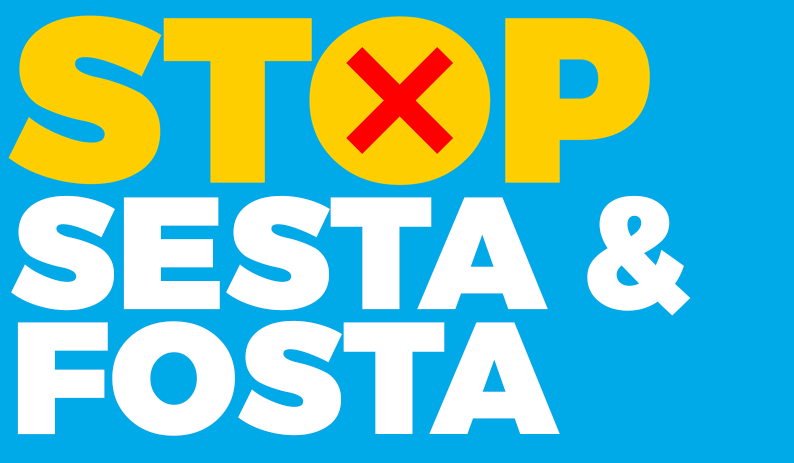
[STOP SESTA & FOSTA – picture from Stop SESTA FOSTA website]
Internet service providers up until FOSTA/SESTA was enacted in April 2018 had been immune for criminal prosecution for any criminal activity of their users but as a result of this legislation can now face prosecution. Clara emphasised that sex work has largely been invisible in the discourse surrounding the introduction of these acts, yet FOSTA/SESTA has potentially lethal consequences for sex worker communities. She argued that FOSTA/SESTA is one step in a longer term trend of the clamping down of online spaces used by sex workers, such as Craigslist Personals and backpage.com, which were shut down earlier in 2018. This legislation has resulted in the closing of sites in which sex workers could share information, create bad client lists, and organise safe spaces, resulting in the loss of resources and information sex workers rely on for personal safety.

[screenshot of FBI seizure notice on backpage.com, taken 12/3/19]
Clara linked the idea of protection with the idea of legitimisation; sex work is yet to be ‘legitimised’ in law, meaning that sex workers are not subject to the same legal protections as other forms of labour. Clara reminded the audience of the statistic that one in three incidents of violence against a sex worker in the US was at the hands of law enforcement officers. With the closing down of online spaces, sex workers find themselves increasingly at the mercy of such officers. One sex worker revealed to Clara that she now carries a firearm as a result of the loss of such information; Clara shared the words of current sex workers in the US and UK who she has interviewed to illustrate the personal and individual consequences of the delegitimisation of sex work.
Clara shed light on the situation in the UK as a result of this legislation; whilst an American Act, FOSTA/SESTA impacts any online data which travels via the US, and the upcoming Digital Economy Act will also create further digital boundaries not just for sex workers here in the UK, but anyone who posts or discusses sex and bodies online. Facebook’s latest community standards update, which is yet to be fully integrated into the sites’ algorithms, contains concerning language which Clara argued can effectively be used to police not only sexuality on Facebook, but has the potential for information on puberty and sexual health to also be censored, with lasting repercussions for us all.
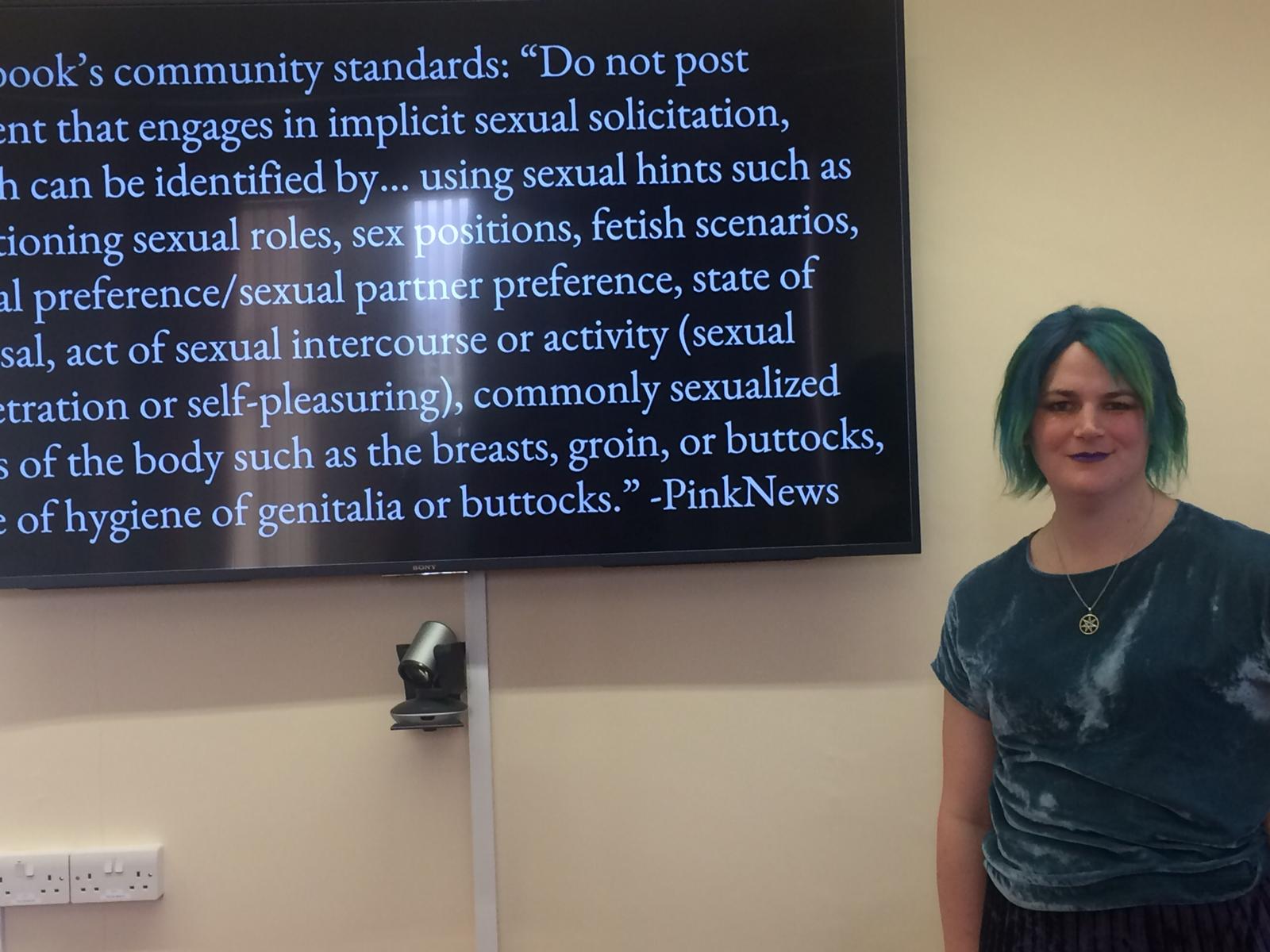
[Clara Sky Barnhurst]
We’d like to thank Clara for her insightful and enlightening talk, and her interviewees, whose impactful words shed light on the reality of the situation for sex workers in today’s political climate.
Join us again on Monday 25th March, 4pm, this time in Edith Morley, room 288, when we will welcome Reading University alum Marco Bernardini with his paper, ‘Gender Identity: Some Visceral Temptations’; keep an eye out for more information soon!
